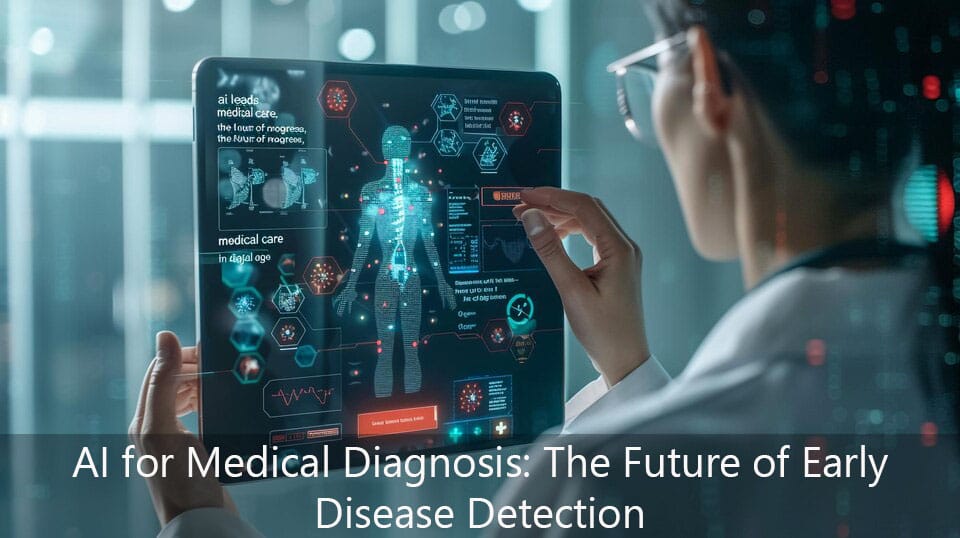In recent years, artificial intelligence (AI) has transformed healthcare, especially in medical diagnosis. AI for medical diagnosis uses advanced algorithms. and machine learning to analyze large volumes of medical data. This provides healthcare professionals with valuable insights and support for better decision-making.
Early disease detection is crucial for effective treatment and improved survival rates. AI enhances our ability to identify health issues early, allowing for timely interventions. As AI technology continues to advance, it promises a future where proactive healthcare is standard practice. Let’s explore how AI is reshaping medical diagnostics and its potential impact on early disease detection.
What is AI for Medical Diagnosis?

AI for Medical Diagnosis uses artificial intelligence technologies to help diagnose various medical conditions. AI systems use algorithms and deep learning techniques to analyze large amounts of medical data. This includes medical images and patient history. By doing so, AI assists healthcare providers in making more accurate diagnoses and treatment decisions.
Key technologies in this field include machine learning and neural networks. These technologies enhance the accuracy of disease diagnosis. The healthcare industry is increasingly adopting AI to streamline processes and improve patient care. By integrating these advanced tools, providers can diagnose conditions more effectively and respond better to patient needs. This integration is transforming medical education and practice.
The Evolution of Medical Diagnosis
The evolution of medical diagnosis has seen significant advancements, particularly with the application of AI. AI algorithms now assist medical professionals in accurately diagnosing medical conditions by analyzing medical images and medical history. Traditional methods are being complemented by AI-driven approaches, enhancing disease diagnosis.
Historically, milestones in AI for medical diagnosis have paved the way for the integration of deep learning and AI systems. These tools enable healthcare providers to diagnose disease more efficiently and tailor diagnosis and treatment plans. The healthcare industry continues to evolve with the use of AI in enhancing medical education and improving patient outcomes.
How AI Enhances Early Disease Detection?

AI enhances early disease detection by utilizing advanced AI algorithms to diagnose disease more accurately. AI in imaging and radiology allows medical professionals to identify subtle patterns in images, leading to faster diagnosis and treatment of various medical conditions.
Moreover, predictive analytics for early disease identification leverages deep learning techniques to forecast health risks. Numerous case studies and real-world examples demonstrate how these AI systems significantly improve patient outcomes by enabling timely interventions.
Benefits of AI for Early Disease Detection
Utilizing AI algorithms in AI medical diagnosis enhances the ability to diagnose disease at earlier stages. These AI systems leverage deep learning to provide increased accuracy and speed, allowing medical professionals to identify medical conditions swiftly.
Furthermore, the implementation of AI reduces human error, facilitating better diagnosis and treatment. This approach proves to be cost-effective and scalable, making advanced healthcare accessible to a broader population.
AI enhances medical diagnosis by employing AI algorithms and deep learning to diagnose various medical conditions. This advanced AI system allows for increased accuracy and speed in diagnosis and treatment, significantly benefiting medical professionals.
Furthermore, by minimizing human error, the technology offers a cost-effective and scalable solution to diagnose disease early, ultimately improving patient outcomes.
Challenges and Ethical Considerations
Implementing AI medical diagnosis presents significant challenges and ethical considerations. While AI algorithms can assist in diagnosing and treating various medical conditions, relying on an AI system raises concerns about potential risks and biases in AI affecting outcomes.
Moreover, data privacy and security concerns are paramount, as sensitive patient information is handled by deep learning models. The ethical implications of AI in healthcare necessitate scrutiny by medical professionals to ensure that these systems accurately diagnose disease without compromising patient trust.
The Future of AI in Medical Diagnosis
The future of AI in medical diagnosis promises significant advancements. AI algorithms will enhance the ability to diagnose various medical conditions more accurately. As medical professionals increasingly use AI systems, predictions for the next decade indicate a shift towards more efficient diagnosis and treatment methods.
Emerging trends and innovations, particularly in deep learning, will empower these AI systems to diagnose disease with unprecedented precision. The role of AI in personalized medicine will redefine patient care, tailoring treatments based on individual needs and enhancing overall healthcare outcomes.
Conclusion
AI Medical Diagnosis has revolutionized the way we diagnose various medical conditions. An AI system can effectively diagnose disease using advanced AI algorithms and deep learning techniques, enhancing the accuracy of diagnosis and treatment delivered by medical professionals.
This innovation not only improves early disease detection but also streamlines patient care. As we witness the profound impact of AI in healthcare, it is crucial to use AI technologies to their fullest potential. Embracing AI Medical Diagnosis is a vital step toward a healthier future.

